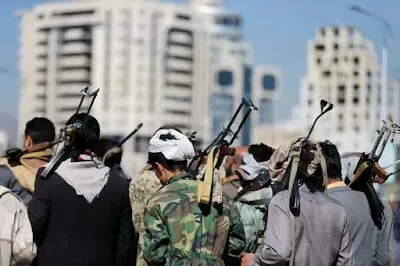Yemen government officials and rights groups have urged the Iran-backed Houthis to stop torturing four abducted journalists held inside their prisons and to urgently send them to hospital as they are suffering from life-threatening diseases. An army officer was killed
Yemenis say that the Houthis have subjected the journalists to physical and psychological torture in detention, throwing them into solitary confinement and depriving them of vital medicine.
Tawfiq Al-Mansouri, Akram Al-Walidy, Abdul Khaleq Omaran and Harith Hamid are among nine journalists who were abducted by the Houthis from a Sanaa hotel in 2015.
Five journalists were freed from Houthi detention during the largest successful prisoner swap between the Yemeni militia and their opponents in 2020.
The Houthis abused the incarcerated journalists, later put them on trial and sentenced them to death on charges of being “cloak-and-dagger” activists for the Arab coalition.
Yemen’s officials and journalists’ families said that they developed severe health problems due to the Houthi torture and are facing death if the Houthis do not take to them to hospital or provide their medication inside cells.
Yemen’s information minister, Muammar Al-Eryani, slammed the Houthis for exacerbating the health conditions of the journalists and called for international action to pressure the Houthis to set them free.
“We hold terrorist Houthi militia of Iran fully responsible for the safety of journalist Tawfiq Al-Mansori, &his fellow journalists who are under forcible disappearance for 7 yrs, after his health deteriorated & contracted chronic diseases due to torture & lack of basic necessities,” the Yemeni minister said on Twitter, accusing the Houthis of using the abducted journalists as a bargaining chip to extract concessions from the Yemeni government during talks.
“We call on intl community and UN & US envoys to observe their legal mandate &pressure Houthi militia to provide urgent health care to journalist Al-Mansouri, release him & his fellow journalists immediately & unconditionally, & stop using them as political bargaining chips.”
International rights groups echoed concerns about the worsening health conditions of the four journalists and Houthi indifference to calls for the militia to treat them well and release them.
The Geneva-based SAM Organization for Rights and Liberties urged the UN and international charity and right groups to put pressure on the Houthis to immediately admit the journalists, mainly the critically ill Tawfiq Al-Mansouri, to hospital.
“SAM calls on the United Nations and the Red Cross to pressure the Houthi group to urgently transfer journalist Tawfiq Al-Mansouri to the hospital and unconditionally release him and all his fellow journalists,” SAM said in a statement.
Due to an intensifying crackdown by the Houthis, who militarily took over power in Yemen in late 2014, hundreds of journalists, activists, politicians and military and security figures have been forced into fleeing Sanaa and other areas, and settled in government-controlled areas or into exile.
The Houthis closed dozens of media outlets, rounded up many of the journalists who stayed behind and confiscated their properties before putting them on trial.
A Yemeni army officer was killed in clashes with Iran-backed Houthis as the warring sides agreed to renew a two-month truce expiring on Tuesday.
Local media reports and officials said that Abdullah Al-Akara Al-Jahami, a military leader on the Marib battlefield and the security chief of Serwah district in Marib province, was killed outside the city of Marib while pushing back a Houthi attack.
“This truce extension includes a commitment from the parties to intensify negotiations to reach an expanded truce agreement as soon as possible,” special envoy for Yemen Hans Grundberg said in a statement.
“In the coming weeks, I will intensify my engagements with the parties to ensure the full implementation of all the parties’ obligations in the truce,” Grundberg added.
The latest escalation in fighting came as a group of Omani mediators left Sanaa after meeting the Houthi movement’s leader, Abdul Malik Al-Houthi, and the head of the Supreme Political Council, Mahdi Al-Mashat.
According to the militia, talks focused on reinforcing the humanitarian and military truce, paying public servants and proposals for ending the war, but there was no mention of any significant outcome.
Local and international aid organizations, as well as foreign diplomats, said that the level of violence has fallen significantly in Yemen during the truce, as thousands of Yemenis traveled on commercial flights from Houthi-held Sanaa to Cairo and Amman.
Fuel ships that docked at Hodeidah port delivered urgently needed supplies to hospitals and businesses in Houthi-controlled areas.
Meanwhile, the Yemeni Landmine Monitor said that since April 2, the first day of the truce, 168 civilians have been killed or wounded by land mines or unexploded ordnance planted by the militia.
Fifty-seven civilians, including 28 children and four women, have been killed and 111, including 47 children and eight women, wounded by Houthi land mines in the past four months, mainly in Hodeidah, Taiz, Hajjah, Al-Bayda, Saada and other areas.
Thousands of mines planted by the Houthis have also threatened farms, ruined or damaged properties, and prevented thousands of internally displaced people from returning to their homes.

